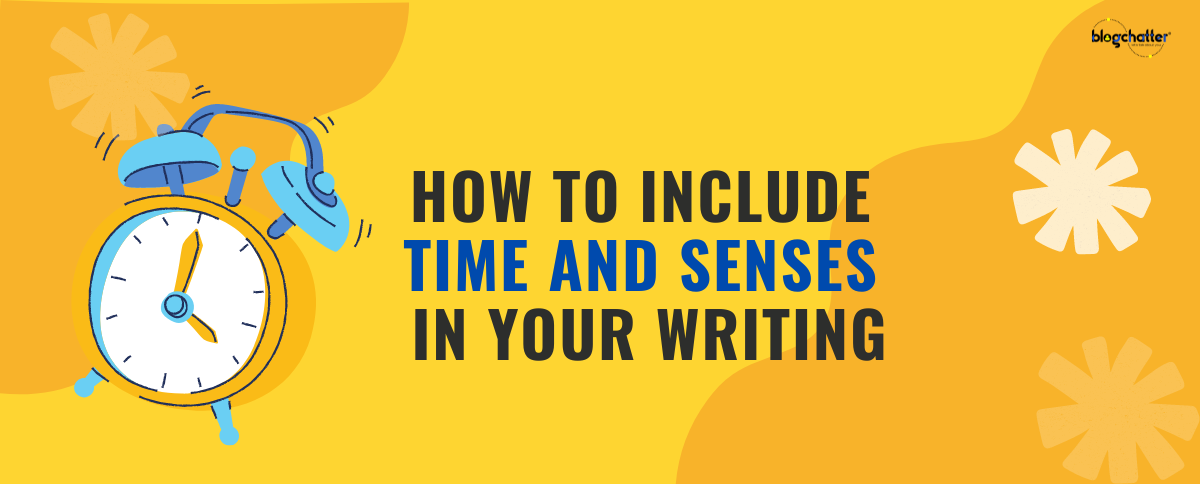I found an unusual word recently. Serein, which means: 'The fine, light rain that falls from a clear sky, just after sunset.'
The moment I read the meaning, I began to envision an evening scene, which was much more vivid than the word said.
Every story that we read creates or must create imagery, which is crucial for good, authentic writing. That's the thing that helps you visualise. And that's why reading a beautiful story is one of the most joyful activities because it feels like a chance to live a different life, in a different world. Mainly because of the writing that evokes evocative and realistic mental pictures through the words.
That was the reader thing ― now, how can you, as a writer, create a different world more effectively? By creating an atmosphere that makes the readers feel and be there. The inclusion of time and sensory perception helps in this endeavour of creating an authentic setting and characters.
Let's talk about time
Suppose, you write, 'A woman is sitting on her balcony, sipping a cup of coffee.'
Now try adding time ―
Whether it's morning, afternoon or evening. Or the weather: On a scorching summer afternoon; or misty winter morning or a soothing moonlit night?
'It was an early January morning…'
The mere mention of 'January' and 'morning' makes you visualise cold, crisp weather. Misty? Or maybe something like this ―
'...the sun sprinkled its weak, silvery sunshine all over the courtyard. The dewdrops clinging to the soft leaves glinted as they embraced the warmth.'
Time is important in our lives and using it in your story can make it life-like.
'This meeting was crucial for her career, and she was getting late.'
Now, let's use a clock. 'This meeting was crucial for her career. The wall clock announced 12:30 pm. Damn! The meeting was scheduled for 1:00 pm, and she was still home.'
It adds more tension than the previous statement did.
Let’s talk about the senses
Now, let's move on to the senses. Some odd sound, sight, unexplained smell, taste, touch or maybe a feeling that someone has just crossed across while you were alone in the house ― the usage of sensory perception in writing enhances the readability, relatability, authenticity and a sense of intrigue.
Building Psychological Effects
When you are writing a thriller or horror, it helps when you build psychological effects as well.
It was 3 am, as I remember, and I was writing. The house was silent except for the tick-tick of the clock. Suddenly I heard some strange, grating sound, which was coming from the kitchen. I got up, instinctively, and started to walk towards the kitchen. And it reminded me of those horror/thriller movies where the protagonist, most probably alone in the house, follows the sound while we, the viewers, find this action stupid.
But the thing is, this is how we react. And this is how your character should too.

Helps with the Twist in the Tale
One of my stories (on my blog), is based on a real-life experience, where the protagonist, who has just moved to a new house, is curious and kind of scared because of a sudden sickly sweet fragrance, and odd, gurgling sound ―like someone was being strangled. In the beginning, the story gives an impression of a paranormal element. So using my senses helped me add the final twist better.
Sensory Perception churns the wheels of a reader's imagination that move with the story.
I am a firm believer in 'show, don't tell.' probably the only writing rule that I try to follow strictly. Graphical representation of time and senses helps you abide by the show, don't tell' rule.
Try to use all the senses, however, you don't have to stuff it; use it seamlessly. The following passage is just an example:
'She could hear the pitter-patter of raindrops and occasional thunder (sound). A pleasant smell emanated from the parched soil outside that was being drenched bountifully.
The yellow light filtering through the grill of the window made a pattern on the wall (sight). Cold drizzles of rain hit her skin like a feathery shower (touch), and she rose to her feet to close the window. She looked out as she pulled the shutters; the road was deserted and the dancing mizzles glimmered under the lone street lamp. She turned and nearly jumped out of her skin as the doorbell blared.'
It's obvious that it's a cold, silent, rainy night, no? And you didn't really ‘tell’.
Two traits that help you focus on time and senses, and create a suitable environment ―
Be an ardent observer and notice things in everyday life.
When writing, try to transport yourself to the setting and feel.
The inclusion of time and senses is a mind game. Readers naturally begin to visualise and feel the atmosphere. It adds a dash of mystery. And, who doesn't like mystery, no matter what the genre is?







Comments
Very useful tips for writers. Thank you, Tarang. :)
Prasannakumary Raghavan Thank you for reading. Glad you found it useful. :)